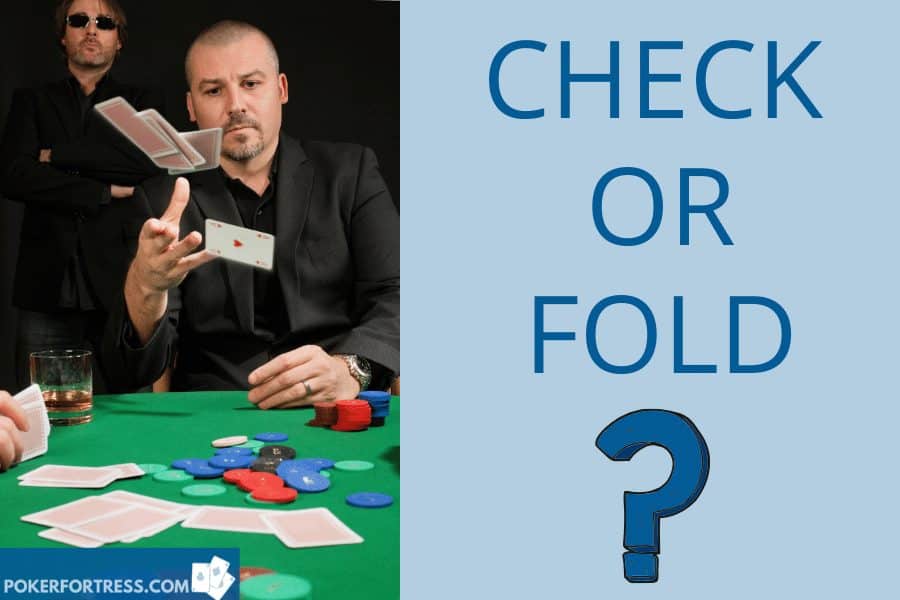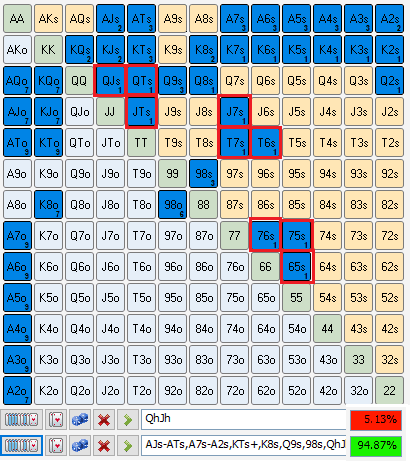You might notice that players sometimes chose to fold instead of checking. What’s that all about? Why would anybody fold when checking is free.
Technically it is allowed to fold anytime during the hand. That sort of action is called open folding in poker terminology, which means that you elect fold when you also have the option of checking or betting. Usually, you should almost always just check when given a choice, but there are some rare occasions when you should consider folding. We will discuss some of them in this article.

Why do People Fold When They Can Check?
99% of the time, that means that they had absolutely no hand, and instead of showing it down, they just mucked it.
In other words, their hand has no showdown value. If a hand has no showdown value that means that it can’t win if cards are turned over. It’s mostly common in live poker since players feel more ashamed of showing you their losing hand, especially if they misplayed it. Online you kind of just shrug it off because nobody can really see you in person. In the other 1%, it usually means that the player made some sort of a misclick.
Live vs. Online
From my personal experiences, the most open folding happens in the live arena. Especially at the cash games where players are just not willing to show their hand to others at the table except when they absolutely have to. It can feel very embarrassing to show stone cold-bluff, you can just feel the judging looks from your opponents. That should not discourage you from bluffing, but it still can be a little uncomfortable if you get caught.
You should be very careful because, in most poker venues, you could be penalized for open folding.
For example, let’s look at the 2020 WSOP rules. Rule 84 states Non-Standard Folds: Any time before the end of the last betting round of a hand, folding in turn when there’s been no bet to you (ex: facing a check or first to act post-flop)… may be subject to penalty. That means that if the dealer or another player makes a complaint to the floor manager, you will be subject to penalty.
Different poker rooms, different rules
We did a quick analysis of how the biggest online sites chose to treat open folding. As you can see in table 1, there is no universal rule on how to deal with open folding. Since it could influence the integrity of the game, it’s not even allowed on some sites.
Sometimes It could be a sign of collusion or chip-dumping. Imagine someone raising preflop, getting called from bb, and just fold when checked to. A clear example of chip dumping (Or in some exceptions, including drunkenness or pure idiotism). It happens extremely rarely, so you shouldn’t worry about it too much.
| Winamax | You cannot open fold till river |
| 888Poker | You can open fold anytime during hand |
| Pokerstars | You can open fold anytime during hand |
| GG | Open fold gets treated as an auto-check/fold |
| Partypoker | You can open fold anytime during hand |
HU vs. Multiway
You should never open fold in a multiway pot. It is even considered as a bad poker etiquette since it could influence a hand in progress. An example of that would be the following scenario.
We find ourselves in a three-way pot on the river where we have a position on both opponents. First checks, second open folds, and it’s on us. If we have a hand that was meant to give up vs. two opponents, we might now consider bluffing and put a lot of pressure on the first opponent.
Most open folding happens in HU pots, especially in SB vs. BB situations. The latest strategies include a lot of limping SB vs. BB, which increases the number of pots being played. Players chose to open fold because they don’t want to reveal with which combinations they are bluffing, so it’s harder for their opponents to figure out their strategy.
I usually do the most open folding HU, on the river, and in position when the opponent checks to me, and I have a hand that can’t win a showdown, and I’m unwilling to bluff.
Lost Information
When you open fold, you don’t see with what kind of a hand your opponent called or bet. That can reveal information about your opponent that you can use in later hands. Did he call you down too wide, or maybe he slowplayed a big hand all the way. In a game of incomplete information, we have to use everything that is at our disposal.
Check or Fold: Examples
Check
Let’s look at a simple example where you might be tempted to open fold: You raise preflop with QhJh and get a call from the big blind. You double-barrel As9hKs8h. On a 2d you decide for some reason not to bluff. Since your hand is only Q high it’s very unlikely that your hand will win in a showdown.
Should you just fold then instead of checking? No, because there is still a minimal chance that our hand will win. In poker slang, our hand is called “nut no pair,” meaning that we have the best possible no pair hand. This hand can still beat all our opponent’s missed draws that decided to play passively. As demonstrated in the picture below we can see that our hand still wins 5% of the time even though we can only beat nine combinations of hands. I remember many occasions when I gave up on the river and checked and was surprised when pot got shipped my way.

Fold
There are some rare instances when you should consider folding instead of checking. Remember, you should only do it and when you don’t influence the action during the hand. The main goal of folding instead of checking is to hide information from your opponents. You do not want to reveal how you played your hand.
In my last poker session, I focused on finding a proper spot to fold instead of checking. Well, it wasn’t that hard to find. In this hand, MP opens, CO calls, I call with 87hh on the button, and BB defends. On the board, JsJd3c6d5d hand got miraculously checked down all the way. On the river, I’m last to act and face a decision.
My hand can’t win at showdown since I have 8 high four ways. My options are to bet, check back, or simply fold. Although my hand is basically at the bottom of my range, it should be a good candidate to bluff, but I just wasn’t prepared to pull the trigger since I wouldn’t be representing too much.
A conventional route would be just to check back and lose. But why wouldn’t you just fold and rob your opponents of information about your flatting range? You are still going to see your opponent’s hands since the hand is going to showdown no matter, but they don’t get to see yours.
Conclusions
So we learned that most of the time, we should be just checking when given the options but should consider to open fold when “stars align.” In general, you should be allowed to fold anytime during the hand except when you could potentially influence the action. Next time when you have a hand that wants to open fold, think about it again because maybe it’s time to put that bluffing shoes on.



